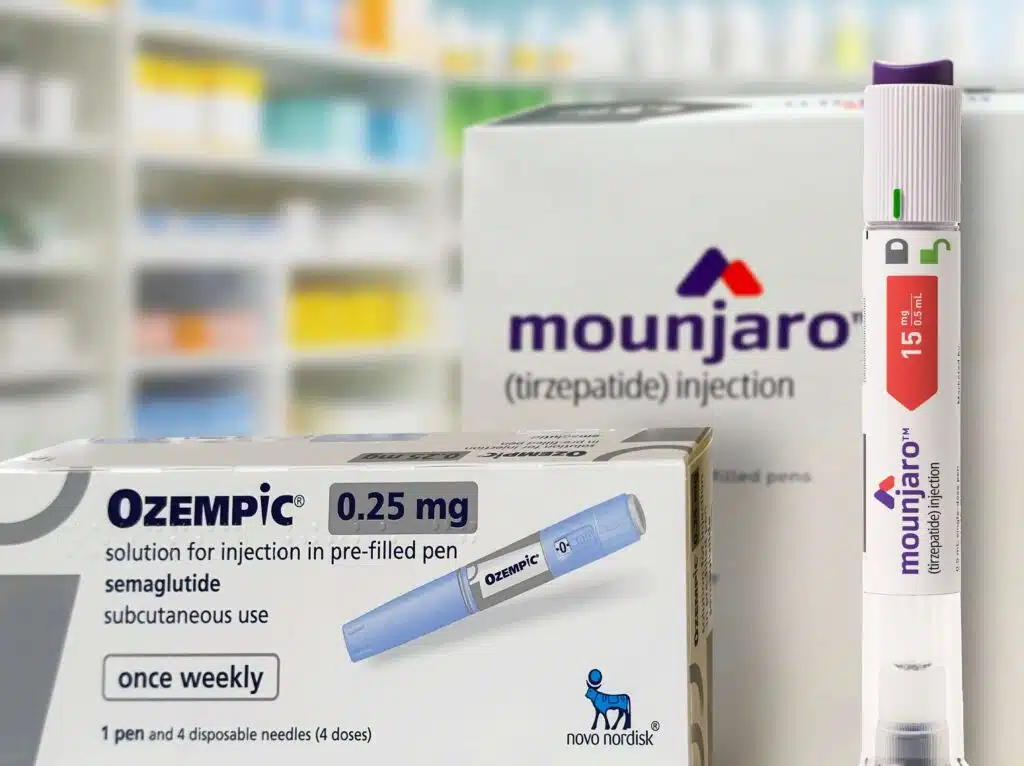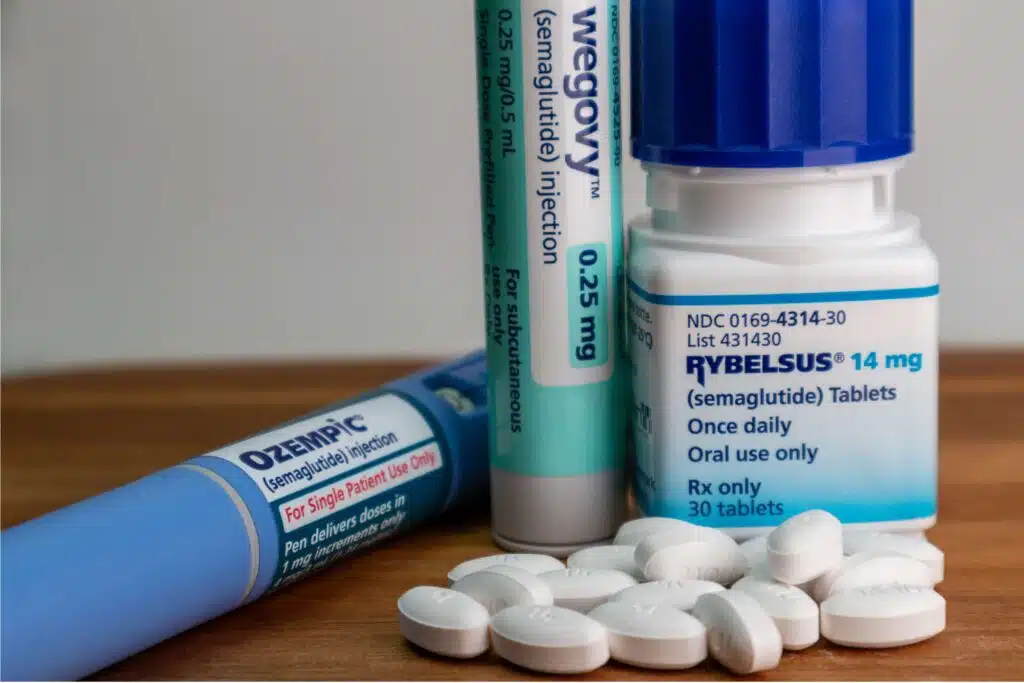Do Semaglutide (Ozempic®/Wegovy®) or Tirzepatide (Mounjaro®/Zepbound®) Reduce Alcohol Cravings?
GLP-1–based injectables like Semaglutide (Ozempic®/ Wegovy®) or Tirzepatide (Mounjaro®/ Zepbound®) changed obesity and diabetes care almost overnight. Alongside weight loss, thousands of patients began reporting a subtler effect: “I just don’t want that nightly glass of wine anymore.” Such feedback—spread across Reddit, TikTok, and clinic waiting rooms—now drive genuine scientific inquiry. If GLP-1 agonists like semaglutide and tirzepatide can safely reduce cravings for substances, they could provide a strong new choice for treating Alcohol Use Disorder (AUD), which currently has few medication options. Yet excitement must be balanced with caution: evidence is early, doses differ, costs are high, and neither drug is approved for addiction treatment. The goal of this article is to sort signal from noise so readers can discuss options responsibly with their care teams.

How Semaglutide (Ozempic®/Wegovy®) or Tirzepatide (Mounjaro®/Zepbound®) Might Blunt Urges
Both semaglutide and tirzepatide stimulate receptors in the gut–brain axis. Those receptors populate reward hubs such as the nucleus accumbens and ventral tegmental area. When activated, they appear to flatten the dopamine spikes generated by alcohol, opioids, and highly palatable foods, translating into less “reward” and—at least in rodents—less motivation to seek the substance. Tirzepatide’s added GIP-pathway activity may enhance this effect, though confirmation in humans is still pending.
What We Know So Far about Semaglutide or Tirzepatide
- Randomised human data (semaglutide). In a 2025 double-blind pilot (48 adults with AUD), once-weekly low-dose semaglutide cut craving scores and reduced total drinks by roughly 40 percent after eight weeks.
- Large real-world dataset (both drugs). A 2023 Nature analysis of 83 000 electronic-health-record profiles found that patients taking semaglutide or tirzepatide for obesity had 50–56 percent lower odds of binge drinking and new AUD diagnoses over 12 months compared with weight-matched controls.
- Pre-clinical evidence (both drugs). Multiple studies show semaglutide and tirzepatide reduce alcohol consumption and opioid self-administration in rodents without sedating them or suppressing normal feeding.
- Trials under way (both drugs).
- An NIH Phase Ib study is testing semaglutide alongside buprenorphine in Opioid Use Disorder; interim safety looks acceptable.
- The first dedicated tirzepatide-for-AUD trial (NCT07046819) started recruiting in 2025, with results expected in 2026.
Please note: No GLP-1 agent—single or dual—has an FDA indication for AUD or OUD, so any use for cravings remains off-label.
Drinking While on Semaglutide or Tirzepatide
Package inserts list no formal alcohol interaction, but two risks deserve respect:
- Blood-sugar swings. Alcohol can drop glucose sharply; GLP-1 agonists enhance insulin release and delay gastric emptying, so monitor glucose closely—especially if you also use insulin or sulfonylureas.
- Gastrointestinal discomfort. Nausea already affects up to one-third of users; alcohol can intensify it.
Most endocrinologists recommend low-risk limits (≤ 1 drink/day for women, ≤ 2 for men) and skipping alcohol on days when nausea peaks.

Safety, Cost, and Coverage
- Side-effects: Common—nausea, reflux, constipation; rare—pancreatitis, gallbladder disease. Mood flattening is occasionally reported.
- Price: About $900–$1 500 per month without insurance. Payers seldom approve these drugs solely for addiction management.
- Long-term unknowns: Existing studies run 8–12 weeks; durability of craving reduction, effects on liver health, and relapse rates after discontinuation remain untested.
Practical Guidance
- Adjunct—not stand-alone. Even if cravings drop, GLP-1 therapy does not replace counseling, medication-assisted treatment, or peer support.
- Dual-benefit candidates. Clients with obesity, type 2 diabetes, or metabolic syndrome may gain metabolic and craving improvements in one shot—provided medical screening and financing line up.
- Shared decision-making. Review pancreatitis history, eating-disorder risk, and current medications (e.g., naltrexone, buprenorphine) before considering off-label use.
- Close monitoring. Track alcohol intake, weight, blood sugar, liver enzymes, and mood; report severe GI pain or vomiting immediately.
- Expect evolving evidence. Larger Phase III trials are under way, and insurance policies may shift if efficacy and safety become undeniable.


Early clinical trials and large retrospective datasets suggest that semaglutide and tirzepatide can meaningfully reduce alcohol cravings and consumption for some people. Tirzepatide’s dual mechanism may even amplify the effect, but proof awaits ongoing studies. For now, GLP-1 therapies belong in the “promising adjunct” category—useful only when folded into a broader, evidence-based recovery plan and prescribed under careful medical oversight. Overland IOP will keep monitoring the science so our clients can make informed, up-to-date decisions as research and coverage landscapes evolve.
Published: June 30, 2025
Last Updated: July 09, 2025

Published: February 20, 2026
IOP Program for Depression
Summary: Depression is one of the most common mental health conditions in the United States, affecting an estimated 21 million adults each year. It causes persistent changes in mood, energy, motivation, sleep, and concentration that interfere with daily functioning, work, and relationships. IOP program for depression provides structured, evidence-based treatment — including individual therapy, group […]
Read more
Published: February 05, 2026
Intensive Outpatient Program for Anxiety
Summary: Anxiety disorders are the most common mental health conditions in the United States, affecting an estimated 40 million adults each year according to the National Institute of Mental Health. While temporary anxiety is a normal response to stress, anxiety disorders involve persistent, excessive worry and fear that interfere with daily functioning, relationships, and quality […]
Read more
Published: January 26, 2026
OCD vs. Autism: Understanding the Differences
Obsessive-compulsive disorder (OCD) and autism spectrum disorder (ASD) are often confused with one another. Both can involve repetitive behaviors, rigid routines, sensory sensitivities, and distress when things feel “off.” From the outside, the overlap can look striking. But in clinical treatment, the why behind those behaviors matters just as much as the behaviors themselves. At […]
Read more
